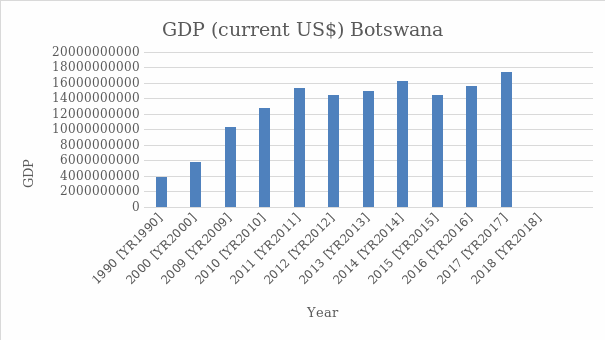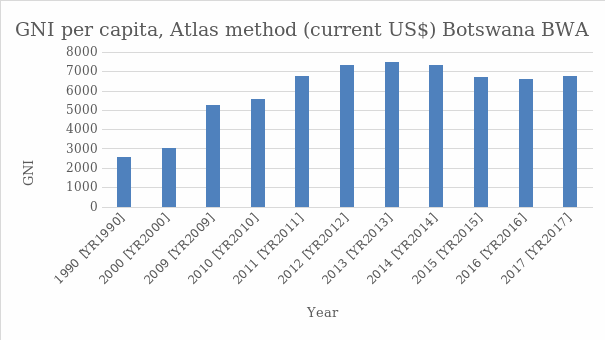Introduction
The process of country development varies in different parts of the world and can provide valuable insight into steps and legislation that can be implemented to enhance growth. Botswana is among the most remarkable countries in the African region because it is an example of economic success. This policy brief aims to provide information about Botswana, analyze its economic development and existing issues, and offer recommendations for improvement.
Background
The Republic of Botswana is located in South Africa and is a remarkable example of rapid economic development. The country gained its independence in 1966 and since then has been enhancing its policies (Hillbom 2015). Prior to this, it was a British colony, as part of the Bechuanaland Protectorate. The colonial history of this country affected its development in the subsequent years because it played a role in determining the specific industries that the state could emphasize. Two million inhabitants are living in Botswana, while the population growth rate is estimated at 1,7% (Hillbom 2015). Currently, the primary issue that should be addressed is poverty because, despite economic growth, the majority of Botswana’s population is unable to provide for themselves.
Development Experience and Recommendations
Botswana’s economy is influenced by the political and social environments of the country and region. As was previously mentioned, it became independent fifty-three years ago, which allowed the country to adopt new strategies and approaches to policies. In general, the World Bank considers the country to be a democracy with a variety of political forces affecting the legislation (“The World Bank In Botswana” 2018). Thus, new policies that should encourage economic growth can be easily implemented by the government.
It is necessary to review the development experience to understand the implications of this progress. In the past, diamonds were essential for the country’s economy (Bolt & Hillbom 2016). Additionally, in the post-colonial years, cattle breeding was among the critical components of welfare for this state. This is connected to the colonial history of Botswana, which had a significant impact on the economy. This historical component played a role in the process because after acquiring independence the citizens had to adapt to new social and political conditions.
Due to effective policies, Botswana is among the most successful African countries. In recent years, the economy of the country has been growing by 5% annually, and currently, the gross domestic product (GDP) in 2018 was estimated at $6,33 billion (“The World Bank In Botswana” 2018). This provides an understanding of the efficiency that the existing governmental approaches have. The primary industries that are developed in Botswana are mining, construction, services, and public investments (“The World Bank In Botswana” 2018). Minerals have a significant role in this state, which facilitated rapid growth. Beef used to be the primary export product in the first years of independence. In 1974, Botswana was able to mine and sell minerals, which created an important source of foreign exchange (Hillbom 2015). While this was an essential component of success for this country, it is crucial for the new policies to encourage the development of other industries.
Thus, the experience of economic development in Botswana has been successful, based on the data presented above. However, similarly to other countries in the region, in the present times, Botswana experiences difficulties due to poverty, high unemployment rates, and inequality (Ray 1998). Graph 1 provides an understanding of the GDP from 1990 till 2018. It is based on information provided by the World Bank (“Botswana” n.d.). It can be concluded that the growth of GDP is significant and constant, which indicates that the country is developing successfully. However, gross national income (GNI) levels remain low when compared to those in other countries, which is a result of poverty. This issue will be examined in detail in the next section of this brief. The information provided by the World Bank provides an understanding of the fact that Botswana has to change its current policies to ensure that this issue is combatted.


The government of Botswana had a significant impact on the process of development. Firstly, they negotiated financial assistance from international organizations to ensure proper infrastructure, more specifically, paved roads (Hillbom 2015). Additionally, despite the initial focus on agriculture after obtaining independence, the government tailored its policies towards decreasing agriculture in the GDP metric, which was successful. As was previously mentioned, the discovery of valuable natural resources helped the rapid growth and the fact that the government avoided policies that would allow it to be the sole owner of diamonds. However, challenges such as corruption were among the primary setback for Botswana. In addition, over the years minerals accounted for approximately 40% of the GDP (Hillbom 2015). Thus, dependence on diamonds that account for the majority of GDP is a threat to the adequate economic growth for this country.
It can be argued that the explanation for Botswana’s successful economic development path is in the effective governance that was in place after it became independent. The ability to invest in infrastructure and seek support from international organizations helped ensure that businesses within the country can be established and grow. Several issues of modern-day Botswana should be combatted to accelerate economic development, which will be discussed in the next paragraph.
Policy Recommendation
The country’s government should focus on improving the social environment of the country. The long history of inequality continues to affect Botswana’s ability to grow and enhance its economic stability. Thus, the international communities should provide support to vulnerable populations in this country and introduce programs that would help them obtain skills that would allow them to work in the modern economy. Additionally, the diversification of industries that operate in Botswana can have an impact on its economy. As was previously mentioned, the government dedicated a lot of effort towards ensuring that agriculture would not be a significant contributor to the GDP. Dependence on natural resources, more specifically on minerals, amounts to the issues that obstruct Botswana from becoming more developed (Bolt & Hillbom 2016). Thus, the government should implement policies that encourage businesses and citizens to invest in other industries.
Conclusion
Overall, Botswana has implications for becoming a well-developed economy with a high standard of living. An essential historical component that affected the country’s growth is its independence from the British Empire. After that, the government focused on ensuring that agriculture does not account for the majority of GDP. Currently, the international community should ensure that poverty issues in Botswana are addressed. Additionally, the policies should assure that businesses are encouraged to invest in industries not connected to natural resources.
Works Cited
Bolt, Jutta, and Ellen Hillbom. “Long-Term Trends In Economic Inequality: Lessons From Colonial Botswana, 1921-74.” The Economic History Review, vol. 69 no. 4, 2016, pp. 1255-1284.
“Botswana.” World Bank, n.d., Web.
Hillbom, Ellen. “Botswana: Caught in Natural Recourses Trap.” Natural Resources as Curse or Blessing: Learning from History, edited by Marc Badía-Miró, Vincente Pinilla and Henry Willebald, Routledge, 2015, pp. 77-99.
Ray, Debraj. Development Economics. Princeton University Press, 1998.
“The World Bank In Botswana.”World Bank, 2018, Web.